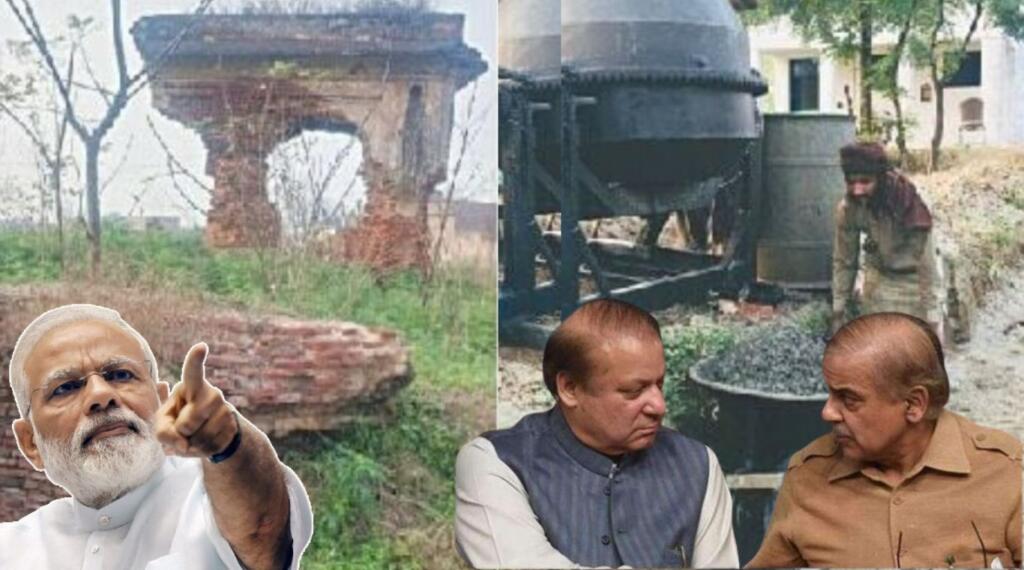In a shocking development, Pakistan has approved a fund of 1 crore Pakistani Rupees to renovate a Hindu temple, Bawli Sahib. It had ceased prayers in 1960 as it was in a dilapidated state. Bawli Sahib is a pre-Independence era temple situated on the western bank of the Ravi River in the Narowal district of Punjab Province. The fund has been approved by the ‘Evacuee Trust Property Board’ (ETPB), an institution that looks after places of worship for religious minorities.
It must also be noted that it is because of ETPB that the temple is in this pitiable condition. According to the former president of the Pak Dharmasthan Committee, Ratan Lal Arya, ETPB’s negligence caused such hardship to Hindus that 1,453 people lost their only place of worship in the vicinity. Since 1960, there has been no temple in the entire Narowal district. According to Arya, his committee has been demanding the renovation of the temple for the last 20 years before the approval was finally granted.
However, there are still two primary concerns. Firstly, the funds will be spent by ETPB, which raises the possibility of corruption. Secondly, given Pakistan’s financial situation, PKR 1 crore is a very small amount. Nevertheless, the development has undoubtedly raised hopes among the Hindu minority as they will get a place of worship after nearly 65 years.
Why is Pakistan spending on minority Hindu temples?
Surprisingly, the Islamic Republic of Pakistan is spending on Hindu temples. One of the prominent reasons for a step like this is to showcase Pakistan as a tolerant and pluralistic democracy, especially at a time when brutal crimes against minorities are at an all-time high and well-documented. Hindus, being the largest minority, have faced the wrath of Islamic fundamentalism in Pakistan. The abduction, sexual exploitation, forced marriages, and conversion of minor girls, often younger than 10, are among the most frequent crimes against Hindus in Pakistan.
Another reason for the temple renovation may be Pakistan’s desire to break the ice with India. India, under PM Modi, has employed a strict policy of “talks and terrorism can’t go simultaneously.” During the past couple of years, as Pakistan’s economic condition has worsened, there have been voices, both vocal and subtle, from Pakistan seeking to resume talks with New Delhi. In fact, Pakistan’s former PM and de-facto leader, Nawaz Sharif, has openly asked to give the bilateral relationship a fresh start.
In any case, if this move is an attempt to grab India’s attention, Pakistan will need to go a few extra miles. Many temples in Pakistan, both large and small, have been desecrated. Some have even been converted into public toilets by fundamentalist regimes. These temples must also be restored to their original form.
Another #Hindu Temple
Hindu Temple Converted To Cattle Farm In Punjab, This temple in Ahmedpur Lamma city of Pakistan which has been converted into a cattle farm.
Religious minorities are not safe in Pakistan. pic.twitter.com/eRJ02GjgPH
— Faraz Pervaiz (@FarazPervaiz3) December 4, 2023
Apart from that, there are other important Hindu temples of the highest reverence. These include Hinglaj Mata in Balochistan and Sharda Peeth in Pakistan-Occupied Jammu and Kashmir (POJK). While Hinglaj Mata is in good shape, Sharda Peeth is in ruins. Movements to restore this sacred site have been ongoing, but the Pakistan Army has consistently obstructed positive developments.
Last year, they even constructed a temporary coffee house on the temple premises. Despite many efforts, the place still awaits resurrection. The Save Sharda Committee, which spearheaded the movement to restore the temple magnificently, has urged the Indian government to take action. The committee, through its delegation in POJK, has also made legal efforts to achieve the desired outcome, but the fundamentalist attitude of the Pakistan Army remains the biggest hurdle.
The committee has been demanding a corridor similar to Kartarpur Sahib so that they can access one of the most sacred Shakti Peeths in Indian culture. If Pakistan truly wants to give new impetus to Indo-Pak relations and start afresh, this PKR 1 crore fund won’t suffice. To begin with, they need to develop corridors for Hinglaj Mata and Sharda Peeth Mandir as a goodwill gesture. Once done, this might become more convincing and give India a reason to view Pakistan once again as a good neighbor.
